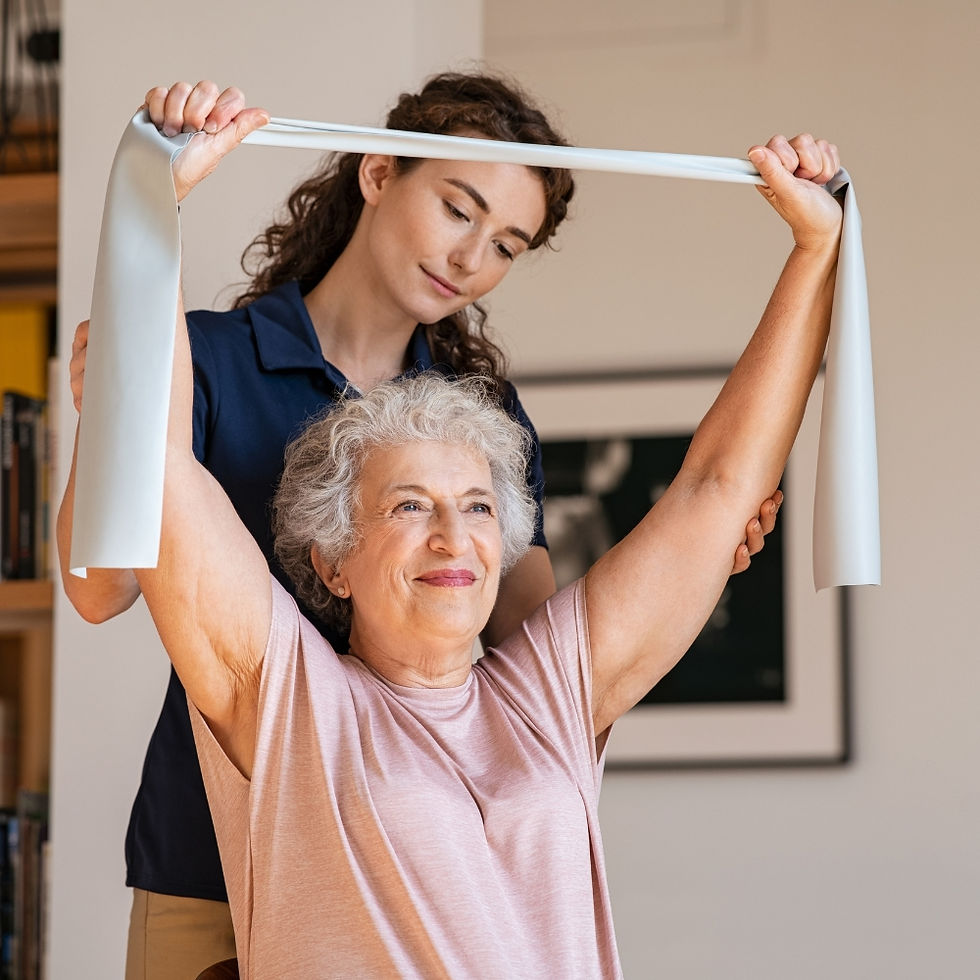How Effective is Physiotherapy for Rheumatoid Arthritis
- Tim Rickard
- Sep 23, 2025
- 4 min read
Living with rheumatoid arthritis can be challenging, as persistent inflammation can lead to pain, fatigue and difficulty performing daily activities. While medications help control the underlying disease process, they are often not enough to restore full mobility or prevent long-term stiffness. This is where physiotherapy steps in.
This article will look at physiotherapy for rheumatoid arthritis and the ways it can work alongside medical treatment to improve daily living.

What is Rheumatoid Arthritis?
Rheumatoid arthritis is an autoimmune disorder where the immune system mistakenly attacks the lining of the joints. This causes inflammation, leading to joint pain, swelling and stiffness.
Unlike osteoarthritis, which is caused by wear and tear, RA can affect people of any age, including younger adults. It typically impacts smaller joints, such as those in the hands, wrists and feet, though it is known to spread to larger joints like the knees and hips over time.
If left untreated, RA can cause joint deformity, cartilage erosion, and bone damage. In addition to affecting the joints, rheumatoid arthritis can also involve other organs, such as the lungs, making it a systemic condition.
How Does Rheumatoid Arthritis Affect People?
Persistent joint pain, morning stiffness, constant fatigue and environmental changes can make living with rheumatoid arthritis physically and emotionally challenging. Simple daily activities, such as fastening buttons, lifting a kettle, pouring tea, preparing meals, or even holding cutlery, can become difficult.
Beyond these tasks, engaging in physical activity, such as walking, may also present significant challenges, often taking a toll on mental health and emotional well-being. Since RA is unpredictable, with periods of flare-ups and remission, people usually struggle with uncertainty in their daily lives. Therefore, effective management, including physiotherapy, is essential for maintaining function.
Physiotherapy for Rheumatoid Arthritis
While medications help reduce inflammation, physiotherapy addresses the physical challenges that come with RA. Sessions may include gentle exercises, hydrotherapy, stretching and advice on posture and joint protection. Physiotherapy will also help individuals manage their flare-ups, conserve energy, and adapt to daily activities. By combining clinical expertise with tailored rehabilitation strategies, physiotherapy not only reduces symptoms but also empowers patients to build and maintain an active lifestyle despite their condition.

4 Ways Physiotherapy Helps Treat People with Rheumatoid Arthritis
Pain Relief & Symptom Management
Physiotherapists use several techniques to reduce pain and manage symptoms of rheumatoid arthritis. While gentle exercises improve circulation, reduce stiffness and promote healing, methods like hot packs, cold compresses and electrical stimulation help ease patients’ discomfort.
Physiotherapists also teach pain-management strategies, such as pacing activities and relaxation techniques, which can help patients cope during flare-ups. Unlike medication, which primarily targets inflammation, physiotherapy provides a hands-on approach to pain relief.
Techniques such as joint mobilisation and soft tissue massage are known to help ease muscle tension, reduce stiffness and improve mobility, addressing the underlying physical factors that contribute to daily discomfort.
Maintain Joint Mobility & Flexibility
Stiffness is one of the most debilitating symptoms of rheumatoid arthritis, often worse in the mornings or after periods of rest. Physiotherapy combats this by incorporating range-of-motion and flexibility exercises tailored to each patient’s condition. Low-impact exercises like gentle stretching, yoga-inspired movements and aquatic therapy can help keep joints supple while reducing strain.
Physiotherapists will encourage regular movement to prevent stiffness from worsening, while teaching safe techniques that avoid overloading fragile joints.
Consistent therapy by maintaining flexibility can help preserve joint mobility, allowing individuals to perform daily tasks more easily and reduce the risk of deformities and long-term immobility, ultimately supporting independence and improved quality of life.

Strengthen Muscles and Supports Joints
Physiotherapy can incorporate strengthening exercises designed to build stronger muscles, which act as natural shock absorbers, protecting fragile cartilage from excessive strain, thereby reducing stress on already inflamed joints and potentially alleviating RA symptoms.
To help maintain muscle mass without overloading the joints, low-impact resistance training is encouraged, using one's own body weight, bands, or light weights. Incorporating core and posture-focused exercises into your muscle-strengthening routine can enhance balance, reducing the risk of falls or injuries. Over time, individuals will find that these strengthening routines not only support their joint function but also improve their overall stamina and resilience.
Enhance Daily Function and Independence Long-Term
Physiotherapy aims to restore independence in RA patients by guiding them in safe, efficient movement techniques that help reduce pain and conserve energy throughout their day. Physiotherapists may suggest adaptive strategies or assistive devices to make daily tasks like dressing, cooking or climbing stairs more manageable. These adjustments not only help patients cope with their symptoms but also support them in staying active and independent long-term, both at work and in their personal lives.
Final Thoughts
Overall, physiotherapy for rheumatoid arthritis is essential for easing pain, improving mobility and supporting long-term joint health. At a trusted physiotherapy clinic , patients can receive personalised exercises and strategies that can help them stay active and independent. This will help them to manage symptoms better, improve mental health and maintain a higher quality of life.



